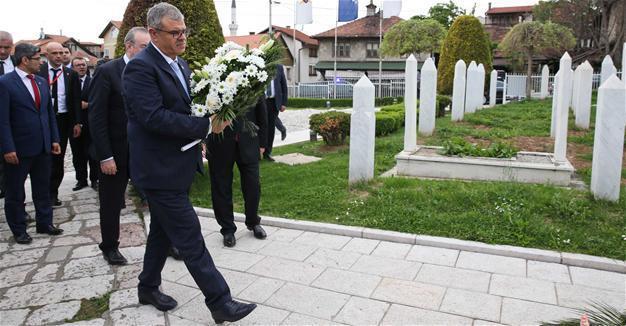Turkish forces offered truce monitoring mission in Idlib: Turkish deputy PM
Sevil Erkuş - SARAJEVO

Turkey was offered the opportunity to establish a cease-fire observation mission in the opposition-held Syrian province of Idlib during a meeting last month in Astana in which Ankara, Moscow and Tehran agreed to declare de-conflict zones in regions controlled by the opposition groups, Deputy Prime Minister Veysi Kaynak told the Hürriyet Daily News on May 12.
The deployment of Turkish troops in Idlib would help protect Turkey’s border security, but the work in drawing maps of de-escalation zones will continue ahead of a final decision, Kaynak said en route to Turkey following a trip to Bosnia and Herzegovina, signaling that Ankara was positive on the proposal in a bid to consolidate its border security.
“They made the offer in the latest Astana meeting. They asked us to set a belt there. That’s necessary also for Turkey’s border security because Bayırbucak Turkmen groups were bombed for months within earshot of us. Also there is a huge area between the region of the Euphrates Shield and Idlib which is under control of the PYD [Syrian Democratic Union Party]. We have to main security right there,” Kaynak said.
Russia, Turkey and Iran agreed in a memorandum signed on May 4 to establish four separate de-escalation zones in Syria for at least six months. The largest de-escalation zone includes Idlib province and the adjoining districts of Hama, Aleppo and Latakia provinces. The guarantors will finalize the maps of the de-escalation zones by June 4. According to the accord, checkpoints will ensure the safe flow of humanitarian aid and provide secure passage for civilians. Observation points will also monitor the cease-fire in the region.
Idlib province is divided between a new Salafist coalition created by Jabhat Fateh al-Sham (JFS), a group formerly known as the al-Nusra Front on one side, and the nationalist Islamist movement Ahrar al-Sham and smaller Western-backed factions on the other.
Afrin, province between Idlib and the Turkish border, is under the control of Syrian Kurdish People’s Protection Units (YPG), which Turkey has declared an offshoot of the outlawed Kurdistan Workers’ Party (PKK).
New military base in al-BabThe Turkish General Staff is continuing work to establish new military base positions in Syria within the knowledge of the international community, with Turkey currently planning to establish a military base on Aqil Hill west of al-Bab, a strategic position in the town where the fiercest clashes between Turkish forces and the Islamic State of Iraq and the Levant (ISIL) claimed the lives of nearly 50 Turkish soldiers, Kaynak said.
Up to 8,000 Turkish troops were fighting in al-Bab at the peak of the Euphrates Shield operation, but the numbers have now decreased to 1,500, the deputy prime minister stated.
As the Turkish government wants to maintain security in the region that was taken from ISIL through local security forces, Turkey has been training Syrian police and gendarmerie forces, according to Kaynak.
Meanwhile, Turkey is working on development projects in the liberated area between Azaz and Jarablus line for resettlement of Syrians who fled the jihadist group.
Syrians are gradually returning home and normalizing their lives, Kaykak said, adding that nearly 250,000 Syrians would need to take shelter along the Azez-Jarablus line.
Some refugees are currently residing in tent camps in Turkey, but 100,000 to 120,000 of the Syrians have nowhere to take shelter.
66,000 children receiving education near JarablusSyrians have also planted new fields with Turkish government support on products such as fertilizer and animal breeding. The government has been constructing schools in nearby Jarablus, and almost 66,000 children are being educated in the region, Kaynak said, noting that even families who are not from the town have been settled there for education opportunity.
“We have made a plan aiming to create a center of attraction in the region which will include schools, social facilities and trade centers. We want to repair schools, hospitals and mosques and construct lightweight steel prefabricated houses [for people] who have no place to be sheltered,” he said, adding that the project was expected to cost up to 3 billion Turkish Liras.
Fewer people have returned to al-Bab because the town lacks electricity and water, Kaynak said. The jihadist group used the public buildings as quarters and destroyed all of them along with neighboring houses as it was leaving the town, the deputy prime minister said.
Humanitarian storehouse on borderThe government has also established a logistics humanitarian storehouse on the border with Çobanbey town, Kaynak said. All humanitarian aid will be collected at this storehouse, which also includes an oil tank as well.
“We do not know what foreign civil society organizations are doing. They have connections with the YPG and others,” he said, accusing some foreign NGOs of aiding local Syrian Kurds.
The oil tank is part of the storehouse in order to prevent “terrorist organizations” reaching oil, the minister said, accusing the PYD of making revenue over oil smuggling.
Turkey’s Interior Ministry recently ended the activities of four foreign nongovernmental organizations operating in Turkey on the grounds of “national security.”
 Turkey was offered the opportunity to establish a cease-fire observation mission in the opposition-held Syrian province of Idlib during a meeting last month in Astana in which Ankara, Moscow and Tehran agreed to declare de-conflict zones in regions controlled by the opposition groups, Deputy Prime Minister Veysi Kaynak told the Hürriyet Daily News on May 12.
Turkey was offered the opportunity to establish a cease-fire observation mission in the opposition-held Syrian province of Idlib during a meeting last month in Astana in which Ankara, Moscow and Tehran agreed to declare de-conflict zones in regions controlled by the opposition groups, Deputy Prime Minister Veysi Kaynak told the Hürriyet Daily News on May 12.